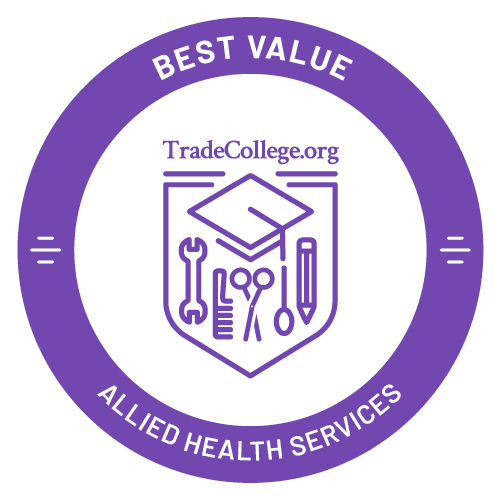Find Trade Colleges
2023 Best Value Allied Health Services Bachelor's Degree Schools in the New England Region
Highlighting Quality Schools With More Affordable Pricing
Finding the Best Allied Health & Medical Assisting Services Bachelor's Degree School for You
With 83,587 degrees and certificates handed out in 2021-2022, allied health & medical assisting services is the #3 most popular major in the United States.
There are so many trade school programs in today's world that it can tough to figure out which one is the right one for you. With more and more schools offering online options, you could even register for a great program on the other side of the country.
Along with in-depth profiles of schools and the programs they offer, Trade College Search has created the Best Value Allied Health Services Bachelor's Degree Schools in the New England Region to help you in your search for the best school for you. This report analyzed 2 schools in the New England Region to see which ones offered the best value bachelor's degree programs for medical assisting students. The goal was to highlight schools with more affordable prices than others offering similar quality experiences.
This ranking is not just a list of inexpensive schools. We also consider each school's quality, since we believe a low-quality school may not be a 'bargain' at any price. Specifically, our score for quality is discounted by the published tuition and fees charged by the given college. This gives the cost per unit of quality for each college. The more quality your dollar buys, the better the value.
For nationwide and regional rankings, we use out-of-state tuition and fees in our calculations. For statewide rankings, we use average in-state tuition and fees.
Featured schools near , edit
2023 Best Value Allied Health & Medical Assisting Services Bachelor’s Degree Schools in the New England Region
The colleges and universities below are the best value schools for medical assisting majors pursuing a bachelor's degree.
Best New England Region Schools for Affordable Quality for a Bachelor's in Allied Health Services
Our analysis found University of Connecticut to be the best value school for allied health & medical assisting services students who want to pursue a bachelor’s degree in the New England Region . UCONN is a very large public school located in the large suburb of Storrs.
The average tuition and fees for an out-of-state undergraduate student at UCONN are $42,102 a year. On average, medical assisting graduates from UCONN take out $20,075 in student loans while working on their Bachelor's Degree. This translates to an average monthly loan payment of $369, based on a 10-year repayment plan.
Read full report on Allied Health & Medical Assisting Services at University of Connecticut
You’ll be in good company if you decide to attend Anna Maria College. It ranked #2 on our 2023 Best Value Allied Health Services Bachelor’s Degree Schools in the New England Region list. Anna Maria is a small private not-for-profit school located in the rural area of Paxton.
The average tuition and fees for an out-of-state undergraduate student at Anna Maria are $41,010 a year.
Read full report on Allied Health & Medical Assisting Services at Anna Maria College
Best Allied Health & Medical Assisting Services Colleges by State
Explore the best allied health & medical assisting services colleges for a specific state in the New England region.
| State | Degrees Awarded |
|---|---|
| Massachusetts | 875 |
| Maine | 300 |
| Connecticut | 933 |
| Rhode Island | 236 |
| New Hampshire | 47 |
| Vermont | 39 |
Allied Health & Medical Assisting Services Related Majors for Medical Assisting
One of 11 majors within the trade school area of study, allied health & medical assisting services has other similar majors worth exploring.
Medical Assisting Concentrations
Majors Similar to Medical Assisting
| Related Major | Annual Graduates |
|---|---|
| Health & Medical Administrative Services | 88,600 |
| Practical Nursing & Nursing Assistants | 85,339 |
| Allied Health Professions | 83,905 |
| Health Sciences & Services | 36,762 |
| Mental & Social Health Services | 30,331 |
Notes and References
*These averages are for the top 2 schools only.
- The Integrated Postsecondary Education Data System (IPEDS) from the National Center for Education Statistics (NCES), a branch of the U.S. Department of Education (DOE) serves as the core of the rest of our data about colleges.
- Some other college data, including much of the graduate earnings data, comes from the U.S. Department of Education’s (College Scorecard).
More about our data sources and methodologies.



